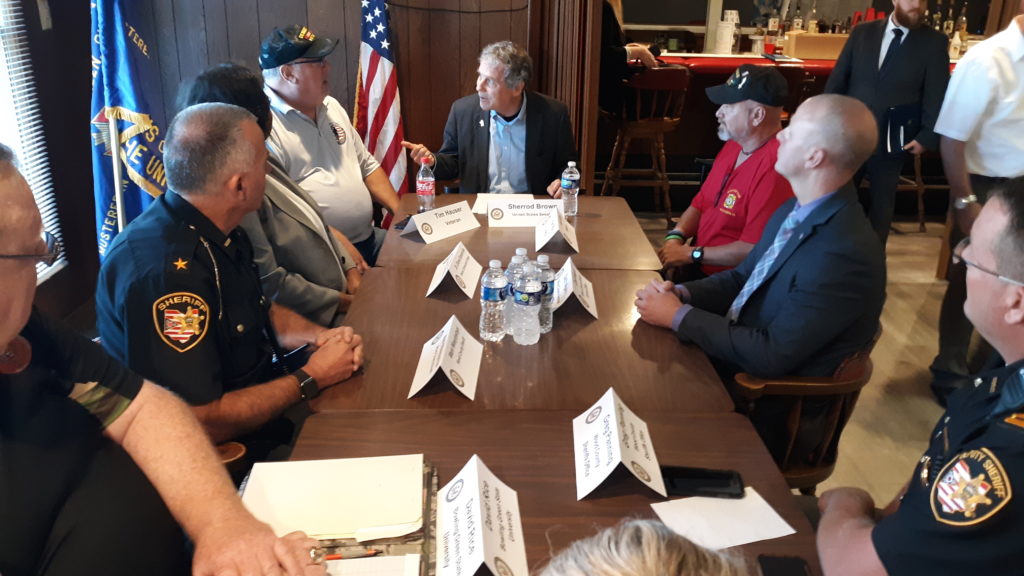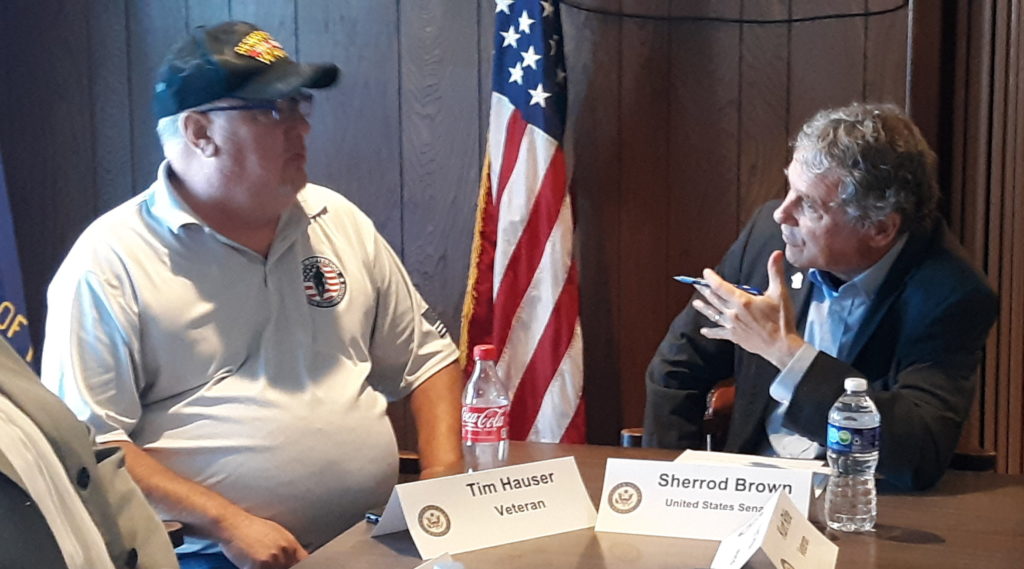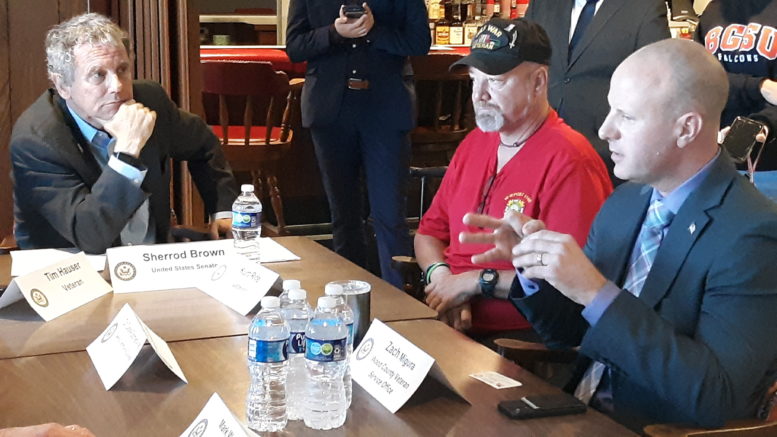By JAN LARSON McLAUGHLIN
BG Independent News
Zach Migura was one of countless service members charged with staffing military burn pits during tours of duty. While serving in Iraq and Afghanistan, he took his shifts at stirring fuel and human waste – a common waste disposal practice at military sites.
Now Migura is charged with signing up Wood County veterans who may have been harmed by exposure to toxic burn pits.
As executive director of the Wood County Veterans Services Office, Migura estimates there are thousands of veterans and survivors in the county who qualify for the Promise to Address Comprehensive Toxins (PACT) Act of 2022.
“We know it’s going to be a lot,” Migura said. “The calls are coming quickly. We’re all getting ready for the tidal wave.”
Migura was one of several veterans and local advocates called together for a roundtable discussion Friday morning with U.S. Senator Sherrod Brown (D-OH).
Brown pushed for years to get the burn pit legislation passed. Now he is meeting with veterans and leaders across the state to find out how to get the word out to veterans that help is now available.
“I really want to hear your ideas of how to reach out to veterans,” Brown said as he sat around a table with veterans at VFW Post 1148 and American Legion Post 45 in Bowling Green.

Brown acknowledged that the burn pit bill took far too long to get passed – three decades later than it should have been. Too many conservative legislators said the bill was too expensive, he said. Brown called that argument “morally bankrupt.”
“It’s never too expensive to send them overseas – but it’s too expensive to take care of them when they get home,” he said, questioning the logic.
Wood County Sheriff Mark Wasylyshyn credited Brown with not giving up.
“Senator Brown was doing the right thing for the right reason,” Wasylyshyn said. “He got it across the finish line.”
Millions of veterans from the Iraq and Afghanistan wars, the first Gulf War, the Vietnam War and a host of smaller deployments across the globe in between those campaigns, are now eligible for expanded health care access and disability benefits related to burn pit smoke from chemicals, paint, medical and human waste, munitions, petroleum, plastics and rubber.
Brown, in turn, credited veterans like Migura and Tim Hauser for not giving up the fight.
Hauser, an Air Force veteran who served during Desert Storm, advocated for the burn pit bill for two years.
“We’re sick. We’re dying,” Hauser said. “We’re being acknowledged now. Now we know our families are going to be looked out for. They are going to be able to pay for our funerals. They are going to be able to send our children to college.”

It is expected to total nearly $228 billion in new spending over the next decade, which will require the Department of Veterans Affairs to hire hundreds of new workers and open several new medical sites to handle the increased workload.
Hauser, who uses a walker and oxygen, said the PACT Act almost faltered when GOP senators decided the legislation would cost too much.
“At one point it looked like the bill was going to die in early summer,” he said.
Jon Stewart joined veterans in rallying the nation to insist the veterans not be abandoned.
Hauser heard from those same GOP senators that their emails and phones were flooded with messages. “The phone lines went down for a while,” he said.
“This would not have happened” without citizen support, Brown said.
The legislation extends services to any veteran potentially exposed to toxic fumes from burn pits – and to their families. It was named after Sergeant First Class Heath Robinson, a central Ohio veteran who died in 2020 at age 39 from lung cancer after exposure to burn pits during a one-year deployment in Iraq in 2006.
“This bill, in many ways, started in Ohio,” Brown said.
Veterans will not have to cut through all the red tape faced by their predecessors who suffered the effects of Agent Orange.
“You don’t have to prove you were near a burn pit,” Zagura said. “This just makes the process a lot easier. This is massive.”
Some veterans meeting with Brown on Friday said they aren’t aware of the services available to them by the Veterans Administration. Several veterans have told him they feel abandoned when they leave the military. Veterans have said “once they couldn’t get me to re-up, they just didn’t care,” Brown said.
Veterans services have been a lifesaver for Kurt Rife, a former reservist who lives near Custar. Rife suffers from a neurological disorder which makes his feet and hands numb, and affects his balance. The ailments have made him unable to continue working as a registered nurse.
“I have a family and I have a home,” he said, explaining that his treatments would have cost him $18,000 every three weeks. “I would have been buried in bills without you guys.”
But many veterans – and the families some left behind – are unaware of the health benefits they have earned.
That is especially true of homeless veterans, said Hauser, who noted that the VA requires an address for processing a claim. A post office box will suffice, he said.
But even well-connected veterans don’t know what benefits they are eligible for, according to Wood County Sheriff Captain Greg Panning, who served in the Marines from 1992-1996.
“I went into public service to serve my country. Now I’m serving my county,” he said, adding that once he left the military, he lost track of the health benefits.
Since so many veterans go into law enforcement professions, Wasylyshyn said he will get the word out to local police departments about the need for veterans to sign up for the PACT benefits.
When inmates are brought to the county jail, they are asked if they are veterans, but many fail to mention their service because of shame about ending up in jail, the sheriff said.
“We need to get past that stigma,” he said.
Also at the roundtable were officials from Bowling Green State University and Owens Community College, who talked about their military members.
Owens President Dione Somerville said her college has about 500 students affiliated with the military. And David Rice reported BGSU has just under 700 students with military affiliations, with approximately 160 in the National Guard, and approximately 200 in active duty.
The university officials agreed that military members and veterans should be signed up now for PACT benefits, even though it may be years before they need them.





